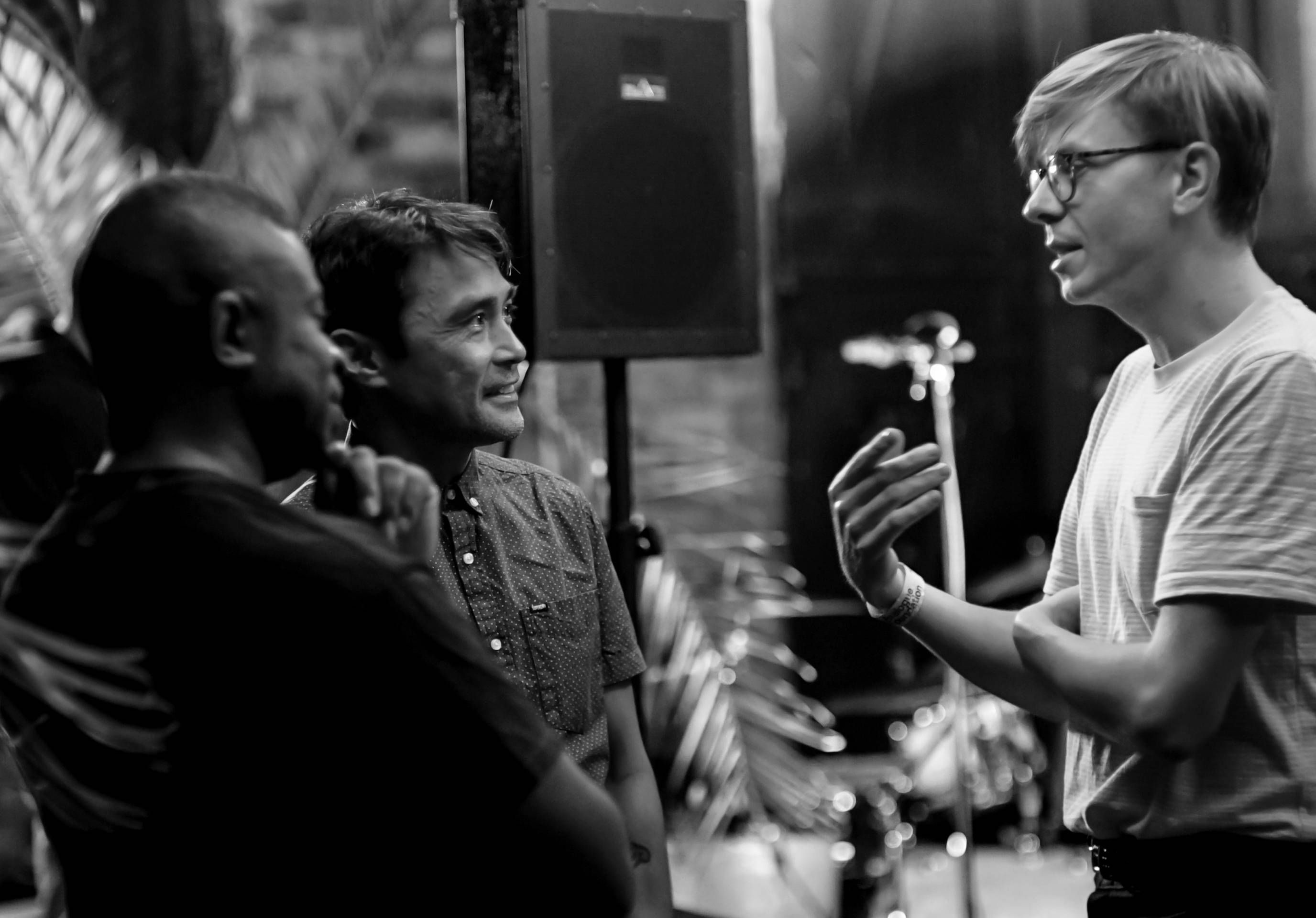What does “Analogue” Mean to You?
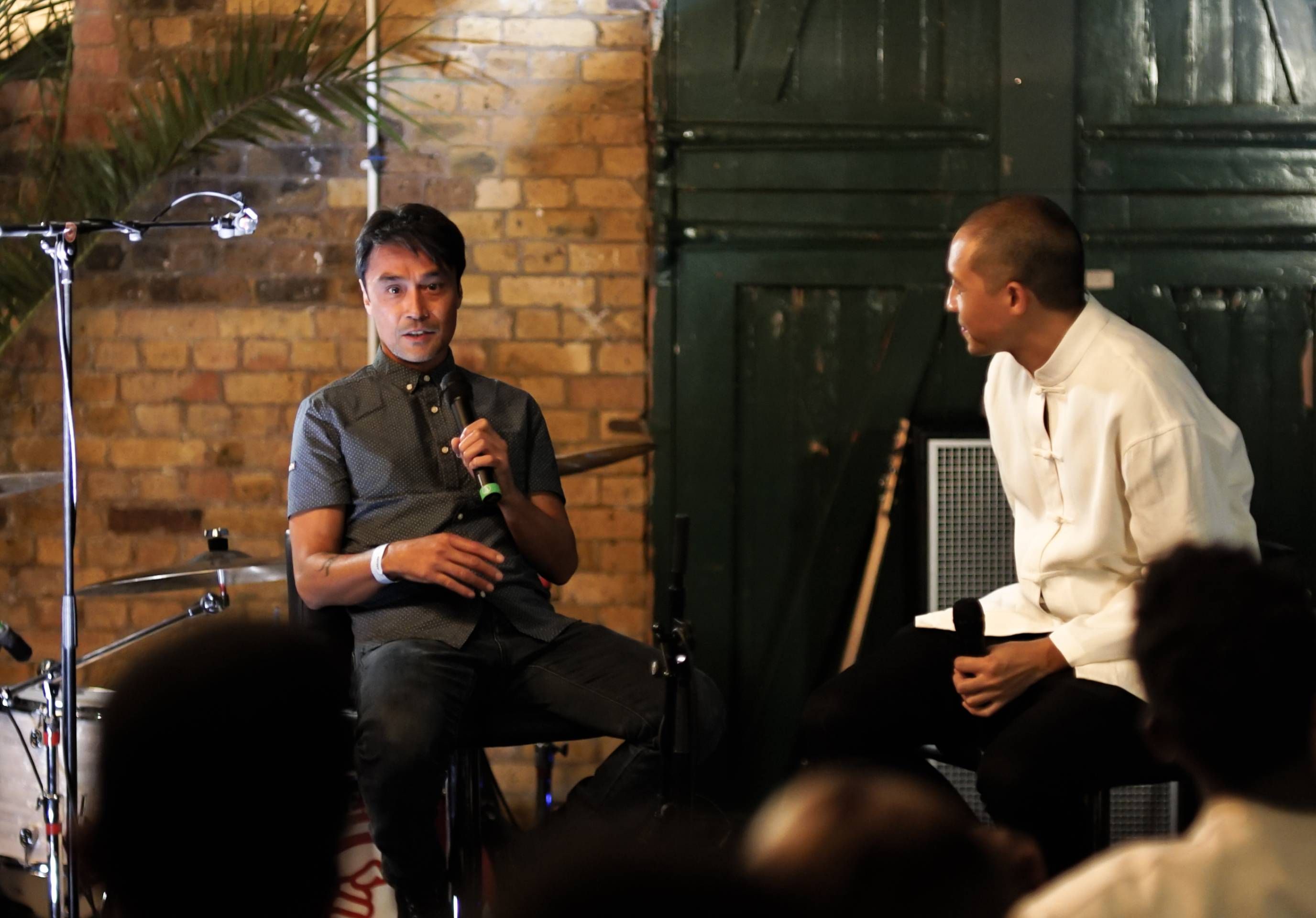
01
Analugue is...
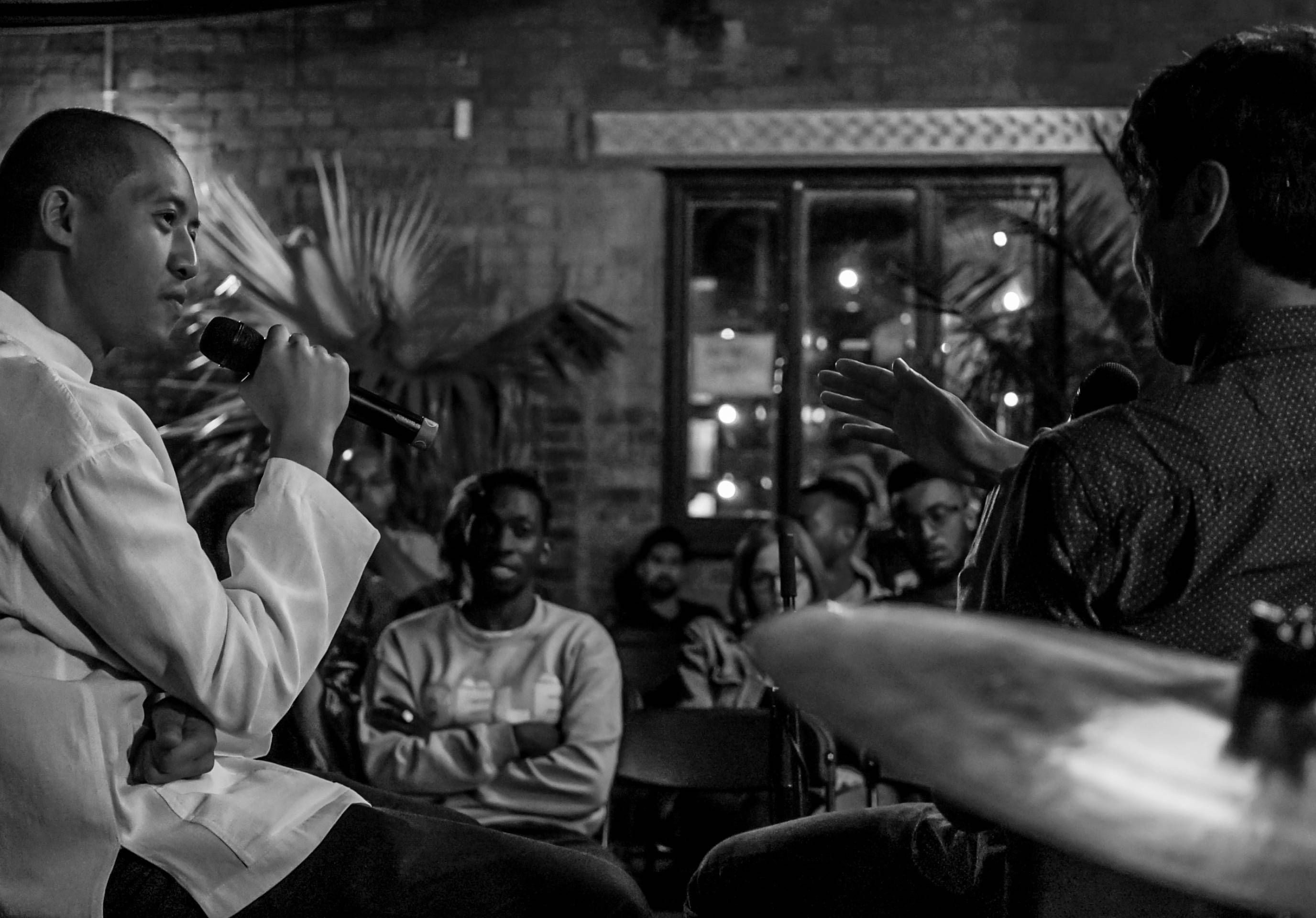
I was always listening to how the record sounded. I was the guy checking who’s the engineer, who produced it, who were the people in the band and then search for “OK, John McLaughlin played with Miles Davis” so I started searching for John McLaughlin records, and just started digging, basically.
Eric Lau : Good evening everyone. Welcome to Giant Steps. This is a special space in conjunction with Brilliant Corners who’ve provided the custom sound system and Analogue Foundation. Just wanted to welcome you all to the space and we’re going to go ahead with the proceedings. So if you’d like to take a seat and make yourselves comfortable, that’d be great.
Analogue Foundation is a new foundation under Audio Technica and the ethos is to create a future for analogue. It’s hard to put into words the absolute mission statement for what Analogue Foundation is trying to do, but we are in our infant stages and with this series of events we’re trying to incorporate anything that comes from unquantifiable energy, so could be in the form of analogue music recording, textiles, tailoring, food or whatever it is that encompasses that unquantifiable energy that we all love and we want to tell that through real human stories as well. So that’s kind of the basis of what the Analogue Foundation is and these events are here to provide you with an insight into our lives and our craft. Thank you very much for coming and spending your time here with us. This evening we are very lucky to have Russell Elevado. To me, one of the greatest engineers of our time so please could everyone welcome Russ to the stage!
Russell Elevado : Hello everybody. Thanks for coming out, I appreciate it. Hi, good to be here.
Eric Lau : How’ve you been, Russ? It’s been about a year or so since Spiritland…
Russell Elevado : Has it been a year already? (laughs) I’m good, I’m busy.
Eric Lau : There’s so much I want to delve into. We kind of want to make this more of a discussion so while this is going on between us, if you have something to add, there should be a microphone in the crowd, so feel free –– if it’s relevant to what we’re talking about –– feel free to ask something. Or if you have a specific question, we’re going to leave it to the end, but if you do have something to contribute, you’re welcome.
Russell Elevado : Absolutely.
Eric Lau : As the co-founder of Analogue Foundation, and I’ve talked a little bit about the ethos; in terms of the first steps of taking the journey for you, yourself, when was the calling to work with music in this way? When was the first calling for that?
Russell Elevado : The first calling? Well, I started out playing guitar when I was 11 and I just picked it up really quickly. I was always listening to music. I would always get presents, always get albums for presents when I was a kid from when I was 5 years old. I’ve got all these older cousins that were just into music. It was a wide range of music – I had cousins who would listen to Motown, then had cousins who’d listen to Led Zeppelin or The Beatles, so this wide range of music from an early age. I started playing guitar but I was always listening to how the record sounded. I was the guy checking who’s the engineer, who produced it, who were the people in the band and then search for “OK, John McLaughlin played with Miles Davis” so I started searching for John McLaughlin records, and just started digging, basically. So when I was 16, I actually wanted to drop out of high school and go to an engineering school, but you know, I needed a diploma before I could go to another school so I was like “all right, I’ll finish high school”. So when I was 19, I started going to school at this place called Institute of Audio Research in New York City and from there, once I started interning before I graduated school and once I walked into a proper studio I just knew this is it for me. And once I started getting on behind the console and seeing what I could do, I was like this is it –– I’m supposed to be behind the glass, not on the other side. So I knew from an early age what I wanted to do.
Eric Lau : How did your parents feel about that at that time?
Russell Elevado : They didn’t want me to get into music at all. (both laugh). Both my parents were accountants. My dad played instruments, he played keyboards and trumpet and stuff…
Eric Lau : … oh, right, OK!
Russell Elevado : … so there was always music in the house, but I don’t think they really wanted me to go into music. They wanted me to pick a more casual, sort of regular job or something…
02
The Beginning
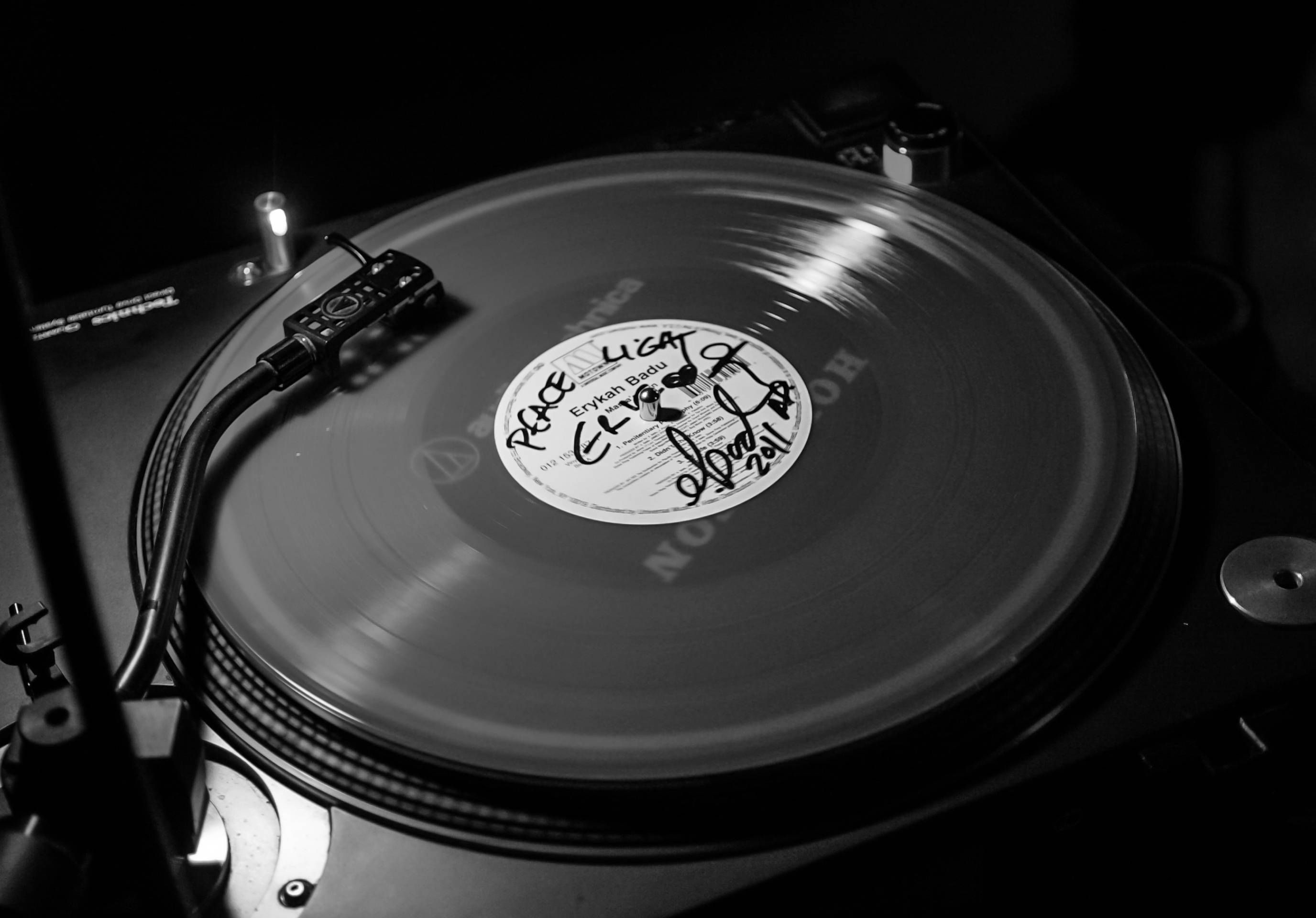
So they would get ideas, but at the same time I was there putting the delays on them, or like a phaser on the Rhodes and that would inspire them to go more out or give them an idea to do this thing so it was like a real community of ideas and music and sounds.
Eric Lau : … yeah, I feel you. Same, same thing… So, at that stage, what were some of the challenges you faced? Coming in as someone on a junior level in a studio environment… what were some of the things that you had to do? Because a lot of people may not know what an apprenticeship is like.
Russell Elevado : It’s a thing that’s missing a lot these days, an apprenticeship –– learning from a master. So yeah, I just started from the bottom and just worked my way up to assistant. I assisted for about 5 years before I started getting engineering gigs, and took me about another year before I really transitioned into being an engineer and, you know, I just got to the point where I was assisting engineers I knew I was better than, you know, and I just wasn’t learning anything anymore. So one day I just said ok even if I go hungry which I did (laughs) I’m not going to assist anybody anymore because I just wasn’t getting fulfilled. I just said one day, no more assisting! And I starved for about a year and a half (laughs), but slowly but surely I’ve started making improvements and impressions on people. I cut my teeth doing a lot of house music.
Eric Lau : Really?! I was not aware of that!
Russell Elevado : Yeah, I was working a lot with Frankie Knuckles and David Morales so all my early engineering work was engineering for them.
Eric Lau : … right.
Russell Elevado : So I did remixes for Chaka Khan and Madonna and I was still in my 20s.
Eric Lau : Wow…
Russell Elevado : But it helped me a lot as I grew into other music. But I didn’t really realise how much of an impact all that early stuff was, because, you know, it’s dance music, and I started getting into soul and jazz stuff. But the way they did their production affected me later on, like getting effects and making quick decisions, getting the bass tight –– it was really helpful working with those guys…
Eric Lau : That’s the main thing.
Russell Elevado : I always remember David Morales would be like “that kick drum sounds like a basketball”! You know when you’re in a gym and you’re bouncing a basketball? So I was always like “man I hope my kick drum doesn’t sound like a basketball being bounced” but yeah, that was a big impact and then I just kept working my way up. I started doing hip hop remixes, was working a lot with this man called DJ Clark Kent, Supermen Productions, and he was doing all the r&b, hip hop remixes. Working with him, a lot of people started hearing my work so a lot kept going on from there.
Eric Lau : So from what you were saying, you realised you had the ear for it so you got to a stage where you thought, I’m confident I can mix this record better than some of the people I’m assisting, right? So, from that the transition of going from assisting to taking lead, I know you said you went hungry for a while, but like when did people say that you have a particular sound? Was it at that stage do you feel like you had a sound?
Russell Elevado : To me, I don’t think I did, but I think what people were hearing was a certain energy that they were hearing from the track and I think, because I was getting good bottom and my drums are really slamming, I think that’s the only kind of stamp that I was putting at the time, but I don’t think it was until after I started working with D’Angelo that people could really notice a particular sound.
Eric Lau : So in terms of the sensibility of being an engineer and going back and forth with the artist or the producer, how did you develop those skills and what do you feel is good for younger people, people wanting to do this? What are the important factors of being an engineer, a mix engineer specifically, to communicate with an artist?
Russell Elevado : I think the most important, in general, in a session, is making the artist as comfortable as possible and the producer. So you create them an environment where, you know… for Erykah Badu, we had candles everywhere. We literally had like 50 candles in the room and that was the only light we had, so it’s things like that. Just sort of being able to judge what people are gonna want. And do your homework beforehand, make sure you know what the artist has done before.
For me, I really get into the artist –– some artists have told me later on that “Man, I didn’t know how to deal with you at first cause you got straight into my core”. I would ask them these real personal questions to understand how the music should be.
Eric Lau : It’s a very unique thing for an engineer because you deal with someone’s music intimately.
Russell Elevado : Exactly. They really put their trust in you.
Eric Lau : Exactly.
Russell Elevado : They could’ve chosen all these other people… and especially if it’s the whole album. That’s really special and I’m going to treat it as the next best album that I’ll do. I don’t want it to sound like the previous album. I treat every album, every artist, in their own special way.
Eric Lau : That’s great. That’s kind of like the mixing philosophies. In terms of the recording process: obviously you were saying that you were doing some of the dance music and then r&b and hip hop –– when was it when people started coming to you to record the whole album?
Russell Elevado : Definitely after Voodoo. That was my coming out. It was an album that was meant to be. For any engineer, that’s like their dream album to do because D’Angelo gave me the freedom to just do whatever I wanted. But we talked a lot about the concept of Voodoo months before it even happened. We were talking about it during Brown Sugar actually.
Eric Lau : Right.
Russell Elevado : Once I started mixing I was like “Hey, let’s make your vocals a little distorted” and I gave him all these ideas that I wanted to do. And he was like “you know, we need to kind of stick to what Bob Power did.” Cause we wanted consistency with the album. But he was like “Tell me more, man. I’d love to do that on the next album.” So we were talking about all this years before Voodoo and I would go visit him in Richmond and talk about everything –– oh, I kind of deviated (laughs). What was the…
Eric Lau : People asking for the whole recording process…
Russell Elevado : yeah.
Eric Lau : … rather than just the mixing process.
Russell Elevado : At that time the concept was… everybody was sampling all these records from the 70s, whether it’s James Brown or who have you, so I thought “I can get that sound” so I started studying all these techniques they were having in the 60s and the 70s and so I tried to emulate those albums and those songs that I loved when I was a kid. I tried to make it my own thing with the fidelity that we have now, you can have so much more bass. So it was a chance to prove what I can do and show people hey, look, you can get all of these sounds, maybe even better now. After that I feel like that’s when people started to recognize what I could do.
Eric Lau : With that process –– you said you were trying to study those old records and you were confident you could get that sound, even with more fidelity; was that at the beginning of the Voodoo sessions or were you already doing that yourself?
Russell Elevado : Yeah, I was kind of doing it myself, just locking myself in the studio and invite musician-friends over, smoke tons of weed and just experiment. We would just record for hours and I would do that all the time.
Eric Lau : You feel like with experimentation, investing in that time, it got to you, to find your sound?
Russell Elevado : I think so. I was really fortunate I knew these guys, jazz musicians; this guy Mario Rivera, who was a saxophone player for Tito Puente, and so he would bring in his jazz friends and they would just jam and I would experiment with different microphones, just as much as i could do, just so that I could be prepared for this next session, whatever that may be. And then D’Angelo comes and says “Here. Here you go. Just go with this.”
Eric Lau : So you were ready.
Russell Elevado : I was totally ready, yeah.
Eric Lau : Wow. that’s incredible! Does anybody have anything to add right now?
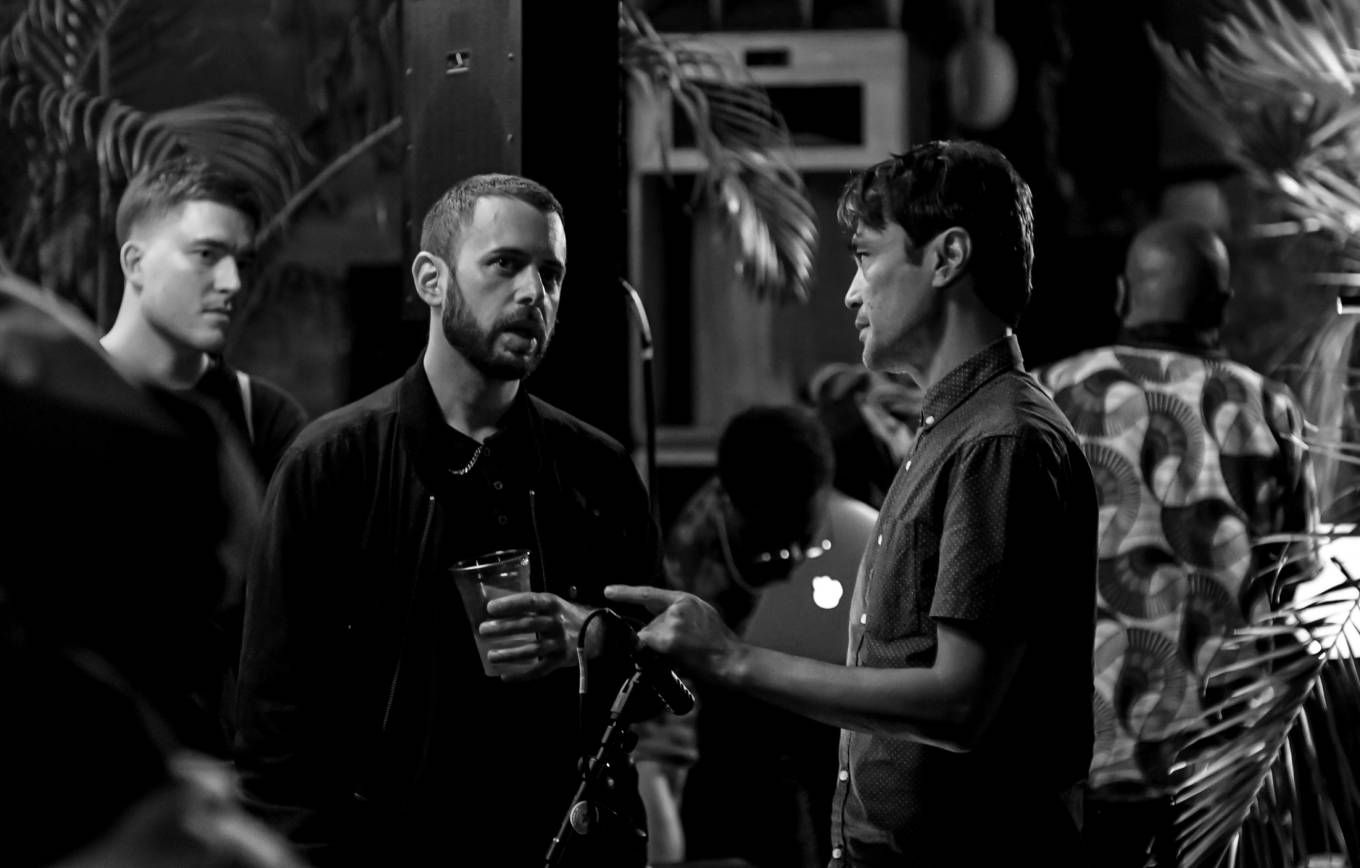
Question from the audience : First of all, I would like to say, Russell, thank you so much for all of your work: D’Angelo, Common and everyone else…
Russell Elevado : It’s my pleasure.
Question from the audience : My question is more about…. Was there a specific landmark moment for you where your emotive understanding of the music took over from your technical understanding? As opposed to approaching mixing a song like oh that reverb needs to be up by a certain amount of decibels vs oh this feels really good?
Russell Elevado : Yeah. I think during Voodoo that was happening where it was just very intuitive and wasn’t really thinking about things. It was a very organic process because they would be in the tracking room and I would be putting effects on them, because they would jam for hours. From these jams there would be the recording that you’re hearing. So they would get ideas, but at the same time I was there putting the delays on them, or like a phaser on the Rhodes and that would inspire them to go more out or give them an idea to do this thing so it was like a real community of ideas and music and sounds. But there was definitely a point when I was mixing the songs, I just wasn’t there. To this day –– certain songs? I have no idea how I got the sound. There’s a lot of Roots records, we were experimenting like crazy and I have no idea how the hell I got some of these sounds. I wish I knew…
(Eric laughs)
… but at the time I was in such a zone, that it was intuition – that’s how it should be, you know?
Eric Lau : so during the sessions –– this is just a selfish question that I want to know –– for the tracks that made it to Voodoo how close was the recording… (to the audience) obviously, on recording stage for any music you try to get it as best as it can be, I would say coming in…
Russell Elevado : Mhm.
Eric Lau : So how far was that away from when you mixed it?
Russell Elevado : That’s a good question! It was really difficult at the end, because I never worked on a project… you know it took 3 years to finish Voodoo and first year was just recording, we didn’t even think about mixing at all. It was just tracking, tracking, tracking and experimenting, putting ideas down and stuff. But I already knew the sound was cool, I wouldn’t EQ anything. Part of the challenge to myself was to record everything without any EQ or compression and just move the mics around until it sounds incredible basically. I had the time to do it you know so much time (laughs) so I just had time to finetune things. But that was one of my challenges that I put on myself, was never touch the EQ. Just go with the right microphone, the right placement, the right mic pre and the right level, and so by the time we got to the mixing stage and I knew as well as D’Angelo and everyone else that’s heard it, I knew I couldn’t stray too far from it. So there was a point where I just stopped tweaking it and just letting it be the way it is. So it was difficult because by the third year, I’ve heard these songs so many times and to stay in zone… I was already thinking about what I want to do like sonically. I wanted to move on already, but the sound was so good, we knew we had to stay there and it was really hard because my brain is starting to go off into the next thing that I want to do.
Eric Lau : That involves a lot of discipline to focusing on what was captured. So with the recording process, you got it to a stage where the energy was there, right, and the mixing was just more controlling it.
Russell Elevado : Yeah. A lot of the mixing was blending in D’angelo’s vocals. Because it would sometimes have, one song ‘The Root’ had like 40 vocals. I mean, back then that was a lot. Now, I’m getting sessions with 40 channels vocals as regular thing sometimes. But then it was unheard of, and he would keep layering… but then a lot of the mixing was just blending his vocals.
Eric Lau : So going to his vocals, we talked about tracking and then management, right? So did he track himself or did you track him?
Russell Elevado : We were doing vocals together and then after a while, because when he was working on Brown Sugar he was doing all the vocals himself, so he came up to me one day and said “Russell, do you mind if I do my own vocals? I can move faster, I won’t have to tell you what section…”, you know? So yeah… we showed him how to punch on a tape machine, how to work the console and everything and that’s it, he did all his vocals like that.
03
About Music Creation
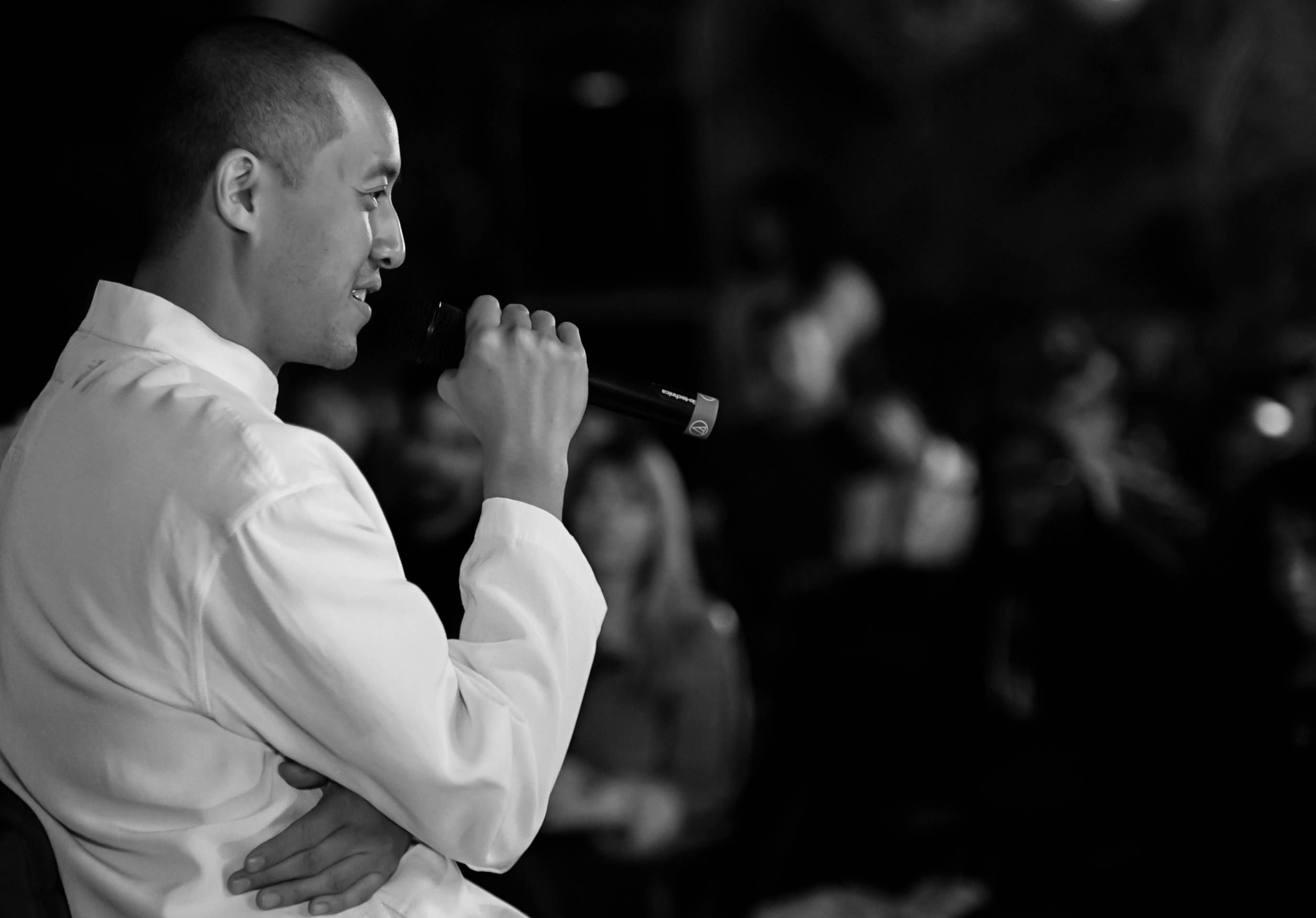
Always try to make sure that you can do it. Even if you can’t. Just say yes and go for it.
Eric Lau : And then in terms of management (to the audience) I don’t know if there are any producers or engineers in here? Could you raise your hand if you make music in any way or… Oh there’s a few, right? Has anyone had a chance to ever mix on an analogue board/desk before? Very few people. So in terms of management, right? We’re talking about 40 vocal; in the digital realm is very easy: you press a plus button, create an audio track and it makes one. And you just do that 40 times –– it’s very easy, right? And you can just group that and name them. Digitally it’s quick. So just so people can have a concept of management, I mean we’re talking about Voodoo; relatively, as you said, it’s compared to Kamasi (which we’ll go into later) –– 40 vocal tracks and then all the other music as well –– what’s your process in the management of all that?
Russell Elevado : When we were doing Voodoo, there was no Pro Tools. Pro Tools was just coming in right towards the end of Voodoo. And I hated it. I hated the sound and everything, especially back then. It’s gotten a lot better but back then it was horrible. But having said that, we did edit 3 songs in Pro Tools because they were live takes and we had to cut sections out and it was the easiest way to do it because of Pro Tools editing. I mean, we did a couple of songs like that, we spliced the actual multitrack tape, but some of these songs were too complicated to do it, but Pro Tools to the rescue, you know? Kudos to Pro Tools for editing. They could’ve improved the sound, but I did a lot of things to that when it came back out and that was better. As far as management, we would have two tape machines, two 24-track tape machines, so all together we would have 48 tracks. That’s all you had at that time. So if you needed more tracks you have to have to find space within the song so like “oh, the tambourine is not playing in the choruses so we can put this guitar part where is the tambourine isn’t playing”. So sometimes you’d have a tape with track 1 with, say a kick drum, a vocal part and then a bass part.
Eric Lau : Oh wow! Right…
Russell Elevado : So the whole tape is filled with all these sounds so I’d have to patch the same track like two of three times and automate the mutes so other parts would be muted when the bass is playing and when the tambourine comes in, I’d have to mute the bass, open up the tambourine track and I’d have to create all on the board.
Eric Lau : (to the audience) Are you hearing this, people?
Russell Elevado : (laughs) So for the vocals, when we had that many vocals, what would happen, so D’Angelo wouldn’t have to play both reels at the same time, because in order to sync up two multi-track reels we’d use what’s called timecode –– which is timecode on both tapes recorded precisely at the same moments. And then we use a sync box and take these two timecode tracks and lock them in to the millisecond or microsecond and that’s how we’d have two machines playing at the same time, basically. It was the only way to do it if you didn’t have a 48-track machine. But that was the standard, that was the norm for years. Once the 24-tracks came out, now everybody started to lock up the two machines so all through the 90s into the 2000s, that was the norm, that was the standard. So, anyway, we would make a mix from all the instruments that were on one machine and we do a submix of that onto the other machine and so that D’Angelo would have a mix on two tracks, a stereo track, and he would have the rest of the tracks to do his vocals on. So when he would run out, we’d have to lock up another machine, do a bounce of the vocals that he had done already so he can have those tracks and then he will have another almost full machine, still have like 20 tracks left to do more vocals. But I didn’t mind because he’s such an amazing singer. I was like “If you want to do more vocals, go for it.” So it’s definitely tricky in the analogue world.
Eric Lau : Two things to add to that. If an artist like D’Angelo says he wants to lay more vocals, the role of an engineer is to say it’s possible.
Russell Elevado : Exactly.
Eric Lau : “Of course you can. Let’s go for it, let’s try it.”
Russell Elevado : You should never say no.
Eric Lau : You should never say no.
Russell Elevado : Always try to make sure that you can do it. Even if you can’t. Just say yes and go for it. (audience laughs)
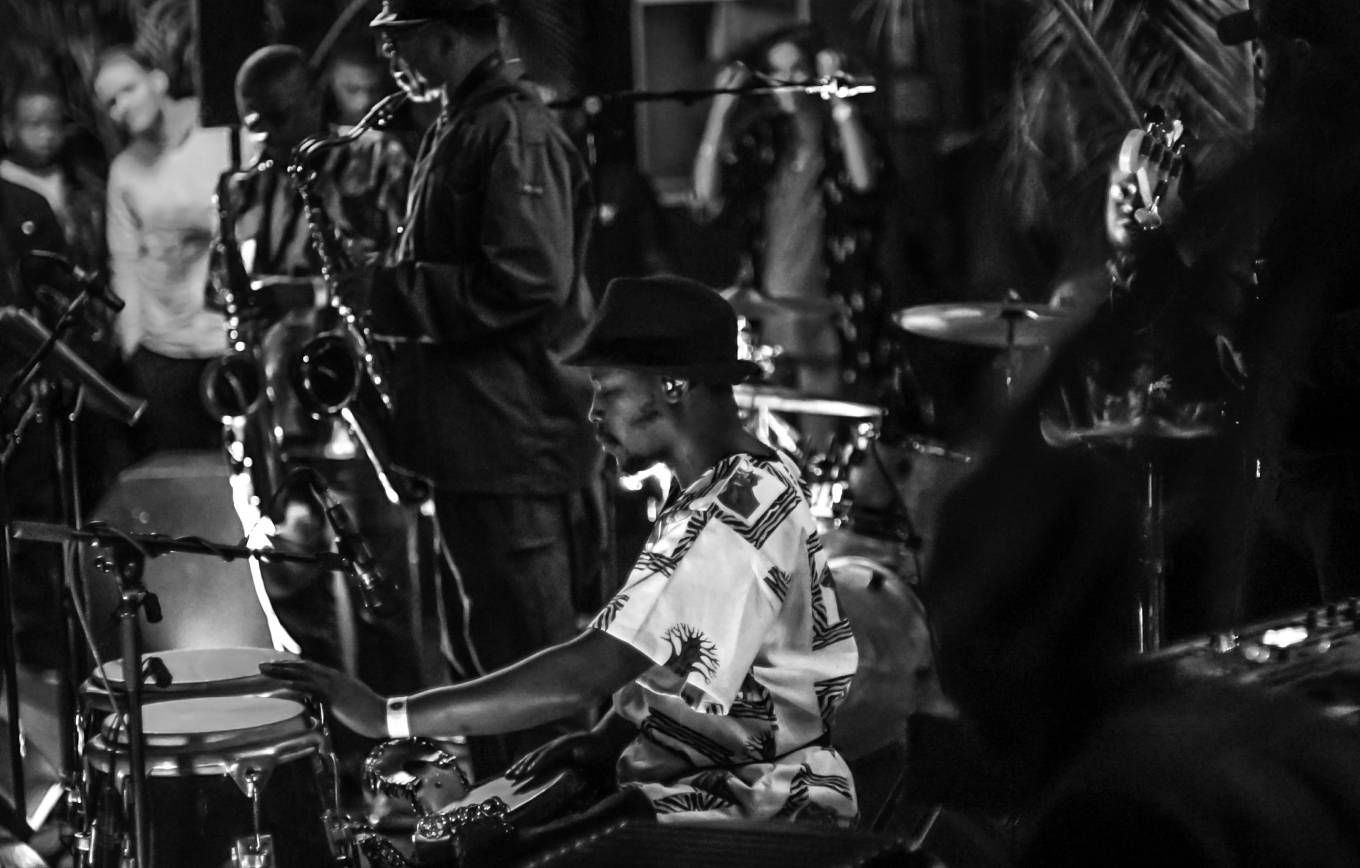
Eric Lau : Absolutely. And the other thing is, in terms of this kind of process in the analogue way, it makes you commit. So if D’Angelo’s got 20 BVs for the chorus and it sounds great, just print it.
Russell Elevado : Exactly. That’s a big thing right now. And I still do it with my clients – I give them a certain amount of revisions to do, but back then, it cost money to be in the studio, so you booked the time and you just had to get it done. You have a time limit, you’re paying for studio time, you’re way over budget, the clock’s ticking. So everybody was making that decision right then and there. Because if you had to –– we call it recall –– we could do revisions like two weeks later, Erykah wants to change her vocals, we’d have to recall the song. What that entailed back then: at the end of the session, the assistant had to write down, in the analogue world, with a pen and paper, with diagrams of the gear, and they would write down every setting with a pencil and every knob would be on a sheet of paper. And then they’d have to write down every single setting on every single piece of gear that I used and all kinds of other notes like in different cues. It was just a lot of notes that the assistant would have to take care of back then. So nobody really wanted to do a recall because half the time it wouldn’t have come back exactly right. Sometimes you’d get lucky and it was pretty much spot on if you went back like a few days later, could be spot on. But two weeks, a month later would be a little iffy, so nobody wanted to do recalls. So that meant when we were there, you knew we had to finalise the mix together, everybody had to be in agreement and say “yep, that’s it”. We wouldn’t take stems to mastering, we didn’t even have stems. We would print an instrumental, acapella, a TV track, you know, just background, no lead, but that was it.
So people just had to commit. And there was no copy and paste. We were copying vocals sometimes – not D’Angelo’s, but other people – so there was a technique we used to use: we would have to offset the two tape machines, so the first chorus was sung to background, we did a full chorus, so we would’ve copied that – because we didn’t have good sampling back then either – so we would’ve actually take that offset the tape machine and record it, find the difference between the first chorus and the second chorus and manipulate the sync box so that the other machine would play in a different spot and then we record those choruses onto the second chorus and then the same thing for the third chorus. It was a bit of a process to just copy and paste, whereas nowadays you can copy and paste like forever. (Eric laughs) And so it makes people lazy. Back then, if you were a musician and you wanted to be a session player or in a band, you just had to be good! You’re in the studio, and if you couldn’t do that part you can’t copy it, you lost that gig. And there’s a lot of that going on right now, where people aren’t committing, they don’t have the same chops, they get lazy, they want to just copy. And I even see it with really good musicians: they say “that guitar and that chorus, can’t you just copy it?”
Eric Lau : Or comp it. Make a comp.
Russell Elevado : And D’Angelo, he’s one of the few vocals… like everything that you’ve heard on Black Messiah and Voodoo, that’s him singing every single chorus, all the harmonies, all the doubles, all the tripling – every single chorus, we’re not copying those into each section.
Eric Lau : Vocalists out there… (Russell and Eric laugh)
Russell Elevado : And that’s why it sounds like that, it sounds so real because it is real. He hasn’t copied it, it’s not the same chorus you heard from the previous chorus.
Eric Lau : I think that type of mentality has affected society as well, in terms of editing, even instant messaging for example. Everything has non-committal response rather than your real, initial instinct to feeling and it’s not real. And it’s affected society and I think it parallels with an honest musical take as well, if you know what I mean.
Russell Elevado : I agree. Everything is changing. That’s why we have Analogue Foundation to keep that alive…
Eric Lau : To remind us.
Russell Elevado : It comes down to just being an artist. Like, if you’re a furniture maker that makes dope furniture, luggage or anything that you’re still crafting with your hands and it’s not mass produced…
Eric Lau : Anything to add right now? Anyone?
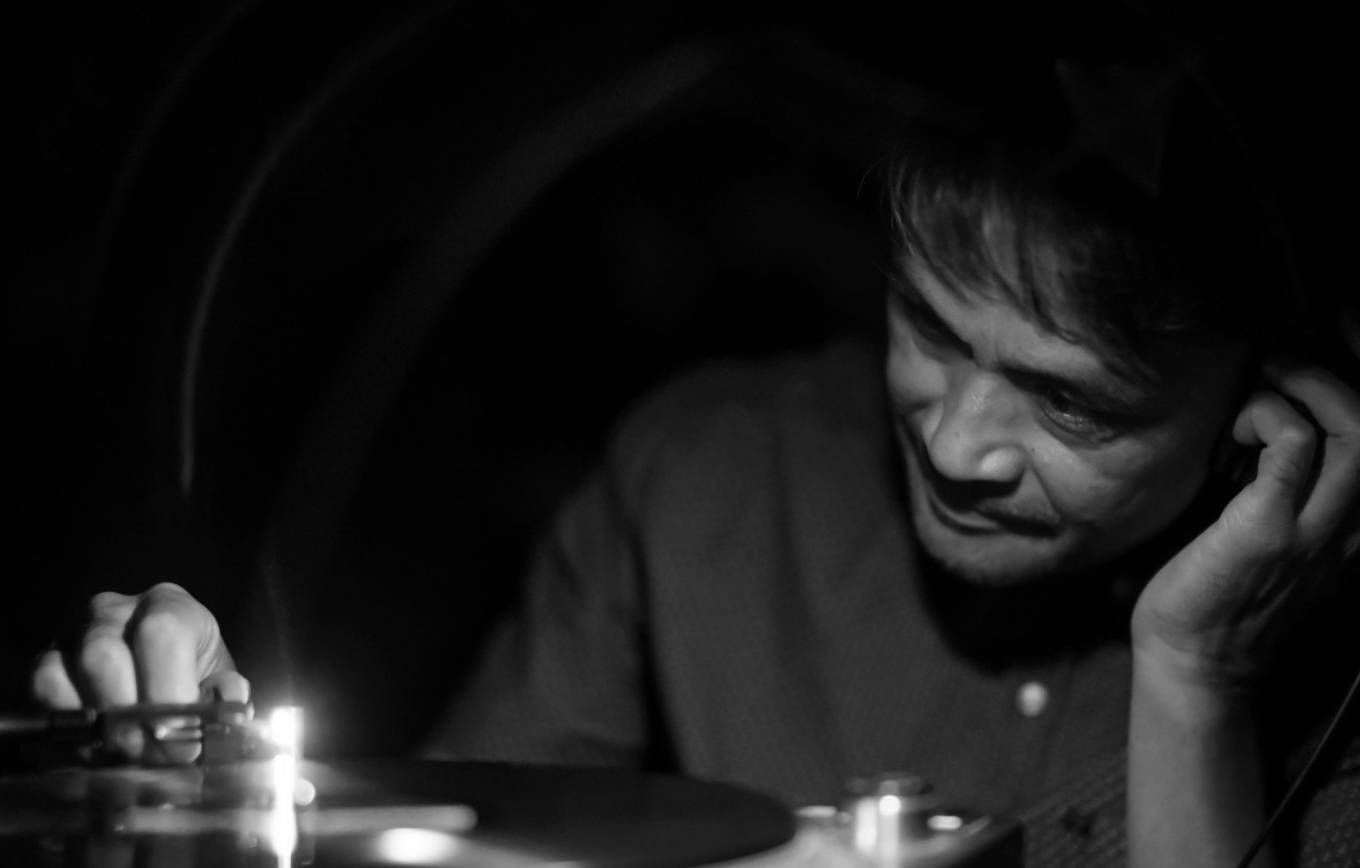
Question from the audience : I just want to say thank you for contributing all your mixing to the music I grew up with.
Russell Elevado : Thank you!
Question from the audience : Just a question, you said you mixed D’Angelo’s album for three years. How did you combat from like creative fatigue? Cause I’m sure that, when you mix music you spend so many hours on it and sometimes you can’t really tell the difference after so many hours?
Russell Elevado : We would just roll another joint in that case and call it a night, basically. (audience laughs) I mean, literally, we would do that and just leave it for the next day. Because I’ve worked on so many records up to that point too, and I just knew my burnout threshold with my ears and my creativity. And it varies from session to session sometimes, if you’re feeling really good, you can just keep working. But I do like to take breaks periodically, give myself a nice break. Sometimes I just work for 20 minutes and I feel like I’m not feeling it and I’ll just stop and take an hour break and I’ll come back an hour later and what I thought wasn’t good was actually ok, because you know, sometimes you get so focused…
But I found a technique to just… I mean if you’re feeling like that, and you’ve got all that pressure, if you just take like an hour and a half or something and just watch a movie or something and don’t feel like you’re wasting time if you’re taking a break, cause you need your creativity to come back… And again, pot really helps. (audience laughs)
Question from the audience : Did you ever have to cut vocal parts or did you use everything? I mean, D’Angelo had like 40 takes –– did you ever had to make a decision to cut parts?
Russell Elevado : There were stuff that we’d take out, but normally when he puts something in there, he really wants it in there so there wasn’t a lot of vocal editing per say. And I wasn’t mixing for 3 years – we recorded for a year straight and we did overdubs for the next six months and then I started mixing within those six months and then it was basically mix in progress. So every time we put up the song it was already in the mid-mix form and then we just keep building from there. So by like a year and a half, we had about five songs that almost mixed (faint laugh) and then another four that we were just starting to mix and by the end of the second year I had most of the album mixed and we had to keep going back because D’Angelo wasn’t happy with some things and we would change a couple of things. Sometimes it took a while because he was stuck on a lyric or the whole bridge, or the whole second verse wasn’t written, but sonically it was already there, it was half-mixed – it was just missing that tiny little thing.
Eric Lau : Going to that, it was a case of… obviously you had the jam sessions, and I’ve been very blessed to do a similar thing for Jazzy Jeff recently, where everyone is jamming and jamming. Did you just had days where you just listen back to the jams and say oh, that could be something, you work on that becomes a form or arrangement?
Russell Elevado : We wouldn’t listen to the jams, we knew we had something that felt really good so we’d listen that evening and if we thought it was something that we could expand on, we would do it right there, on the spot. It was pretty efficient that way because the would know when it was right so we’d usually work on that at that time.
Eric Lau : That’s great, to have that immediacy… to have everyone in the room and be there, committed. It’s rare nowadays.
Russell Elevado : I know, yeah. It is rare.
Eric Lau : Moving on to more recent times, because we only got 10 minutes left…
Russell Elevado : Wow, that’s fast!
Eric Lau : … already. The Kamasi Washington project. Tell us about that. I mean, that was a huge task.
Russell Elevado : Yeah! I’ve done a lot of sort of epic kind of songs, so people come to me with these huge tracks… but the crazy thing with Kamasi, I hadn’t listened to him and I kept hearing about him and finally I was at my friend’s house and he was like “have you heard Kamasi?” and I was like “Yeah, let’s listen to that, I’ve been wanting to hear it.” He put it on and I thought it was so cool, I would love to work with this guy. A month later, guess who calls me? It’s Kamasi. Which is crazy! We go along really well because he knew my work and I loved his stuff and everything. When that happens it’s just magic, it becomes this really cool, special thing. When I first got the tracks, it was over 200 tracks and I never mix in the box so I really had to get all of these tracks down to a workable number. So I did a lot of pre-mixing at my studio before we got into the studio together. So it’s been a long time just trying to comp things down and try to get it to a workable amount of tracks. So I got them down to about 100 tracks (laughs)…
Eric Lau : Wow!
Russell Elevado : … which is a lot. The reason why there were so many it’s because he’s got two drummers, bass player – Thundercat –– with guests sometimes, two keyboardists, 3 horn players and then we had a choir…
Eric Lau : How many mics on the choir?
Russell Elevado : I don’t know (laughs) but it’s a 26 voice choir triple tracked, and a 50-piece orchestra. Triple-tracked. So it was crazy! I’m so happy with the way it turned out, because was a technical nightmare, basically. (laughs)
Eric Lau : It’s a challenge.
Russell Elevado : It was a challenge, but I love challenges, so… I was totally up for it. And I was just so happy that he called me do it because it’s such a great album and he’s a sweet guy, he’s a great composer, great human being and it was just a pleasure. We’ll be doing more albums together for sure.
Eric Lau : That’s a lot of tracks! (audience laughs)
Russell Elevado : Also, mixing two drummers and trying to make it sound sometimes like two drummers and sometimes like one drummer… you want it to sound like you forget there are two drummers and see if you can fuse them well enough so people don’t go “uh, what’s that?”
Eric Lau : (to the audience) Just to let everyone know, in mixing, phasing is one of the challenges and having two drummers trying to hit at the same time is very difficult, so to make that make sense and make it musically comfortable is a challenge. It’s a very difficult challenge.
Russell Elevado : Yes, it is.
Eric Lau : Unfortunately, time has gone so quickly. I’d like to open it up to the audience, if anyone has a question this is your opportunity now. So, Ed, can you please pass that microphone?
Eric Lau : That was quick.
Russell Elevado : It was quick. Good talk. I talk slow, that’s why…
Eric Lau : Me too.
Question from the audience : My question is, when you were doing… maybe more so on the Voodoo album, or maybe Kamasi, but I don’t know if you were in the sessions while they were recording Kamasi Washington’s…
Russell Elevado : I wasn’t in the recording process, just mixing.
Question from the audience : So I guess, with instances where you were there, maybe before Pro Tools, and everybody’s jamming… did it always take a period of time before everybody’s in sync, in terms of on the same page, when the magic starts to happen?
Russell Elevado : The magic was there from the beginning. It really was. Both of us, D’Angelo and I were really excited because we were working with Questlove. And we were fans of Questlove’s and they started working together. And they became like brothers, basically. Both Prince fanatics –– I mean Fanatics! they were showing each other different bootlegs that the other person didn’t have. So they just hit it off right away. At first it was just D’Angelo and Questlove. And right at the beginning of the recording of Voodoo, D’Angelo is invited to do a duet with BB King. So we went to the BB King session and we met Pino. It was crazy, we were waiting for BB King to come and they were like “let’s just jam out until he gets here.”
So D’Angelo gets behind the piano and it’s all these veteran musicians. You can imagine… it’s BB King, it’s like the best in the world. And yeah, Pino’s there, so he started doing Marvin Gaye Heard It Through The Grapevine and Pino is note for note James Jamerson and D’Angelo was going like “What the hell?!”. So after they were jamming, he came to me and said “Yo, man, I found my James Jamerson!” and I was like, “I know, I can’t believe it!”. But I had known Pino’s name, I had seen it on different albums and stuff. So we introduced ourselves and Pino said “You’re D’Angelo, right? I love your stuff!” – ‘cause he had Brown Sugar. So we were like, “Oh my God! You gotta come to the studio!”. And sure enough, he gets to the studio and it was magic. The three of them together, that’s all you need sometimes. Like I said, the magic was there from the very, very beginning. And we were at Electric Ladyland, and D’Angelo was just a new Jimi Hendrix fan. We were just like “Whaaaaat?” (Russell and the audience laugh).
Eric Lau : Wow! Thank you very much for that question.
Russell Elevado : We’ve got time for one more? One more.
Eric Lau : We have time for one more question. This is the final question.
Question from the audience : Again, thank you for all your music! It’s incredible. On the organisational tip, you said your assistant had to do crazy, crazy notes. Did you have rules that you set for organisation yourself? Did you find that you had to be meticulous, because sometimes being too organised can block the flow…
Russell Elevado : Yeah
Member of the audience : … of the creativity and being in the moment.
Russell Elevado : Yeah there’s definitely a fine line and I told myself from very early on that I wouldn’t get too technical. But I am definitely meticulous so I took just crazy notes, you know? When we first started I would write down everything that just happened in the session, but by the second month I had stopped doing that. There was just too much! But I did take a lot of notes, especially different takes of different jam sessions. In fact, he totally forgot about the Spanish Joint. Charlie Hunter was still in the studio and was like “Is there anything else I’m forgetting?” and I said “What about Spanish Joint?” and he was like “Oh shit! The Spanish Joint!” If I hadn’t written it down, probably, who knows if it would’ve ever been recorded? So I made sure to keep extensive notes on things that I thought would come up later on.
Member of the audience : Did that translate for you, from pen and paper, back in the analogue days, to more digital? Are you putting it in the same place or are you staying in the same way you started?
Russell Elevado : A little bit of both. Sometimes is just easier to pick up the pen and just write it down, but I also have notes in my phone –– I’m constantly doing that, just writing down different ideas.
Eric Lau : I’m afraid we’re going to have to honour the set times so we’re going to have to move on. We’ve got 2000Black Levels of Consciousness live coming up in a minute. Russell is going to play a selection of records afterwards so please stick around. We’re going to clear out the chairs and get ready for 2000Black.Thank you very much!
Russell Elevado : Thank you, guys! Thank you for coming.
Eric Lau : Thank you!
Russell Elevado : Stick around.
Eric Lau : Yes, please, stick around.
Next Voice
What does “Analogue” Mean to You?
Channel One
“When you build something with your hands, it's not 100% perfect. That is like life. Life is not 100% perfect.”
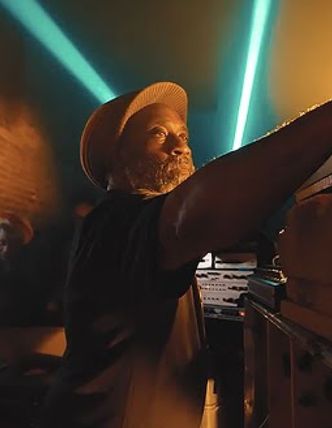
One of UK’s most known and respected reggae sound systems.
